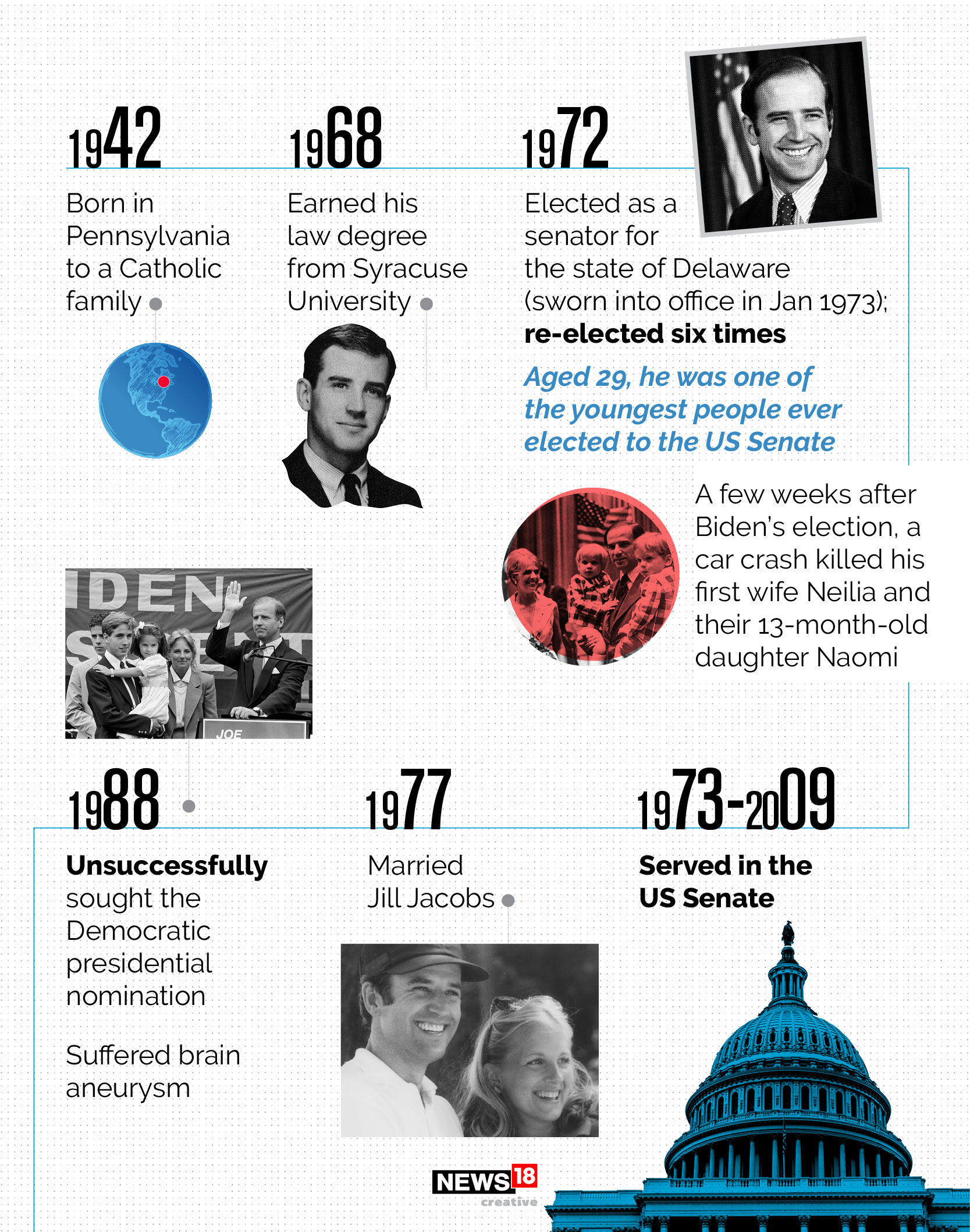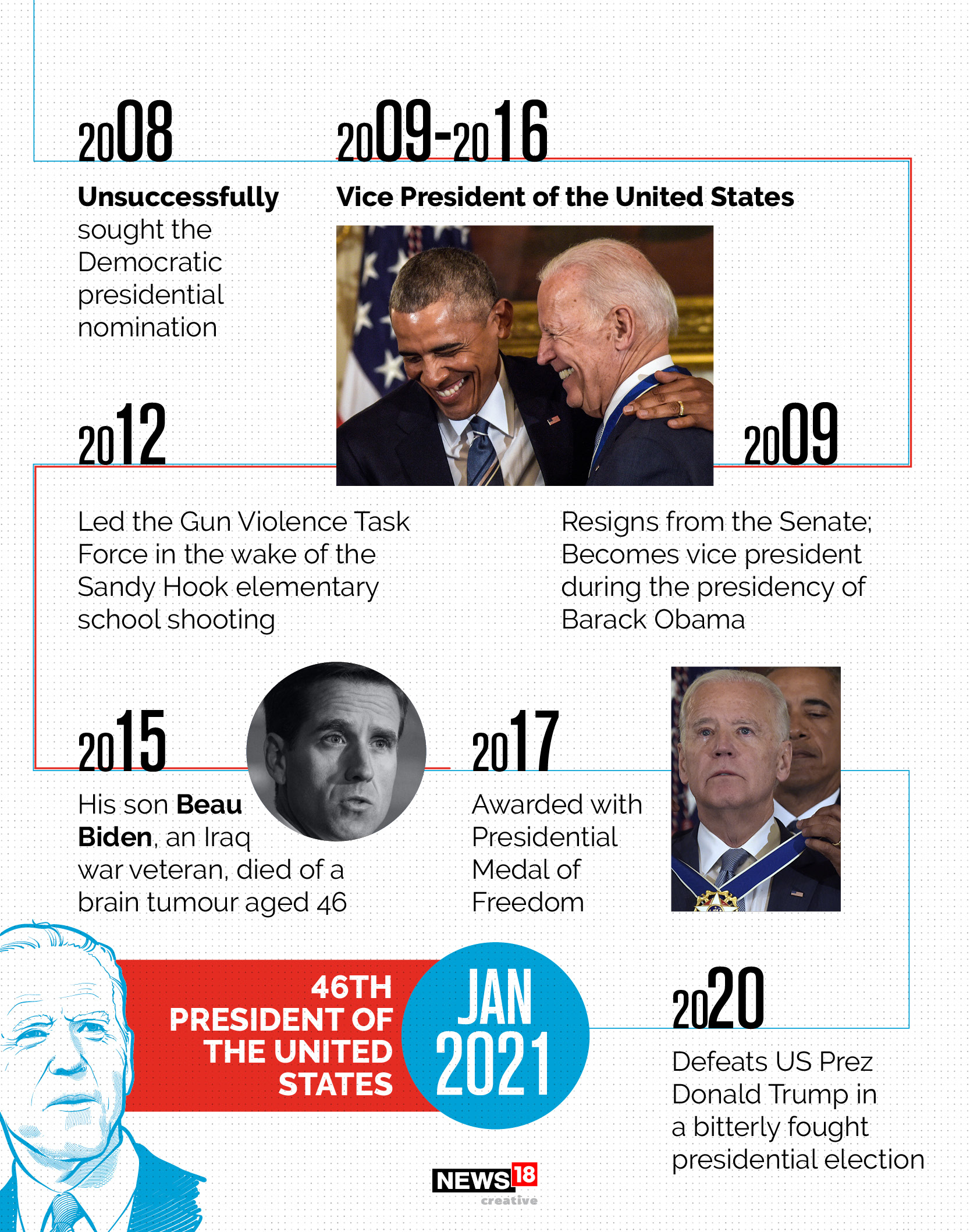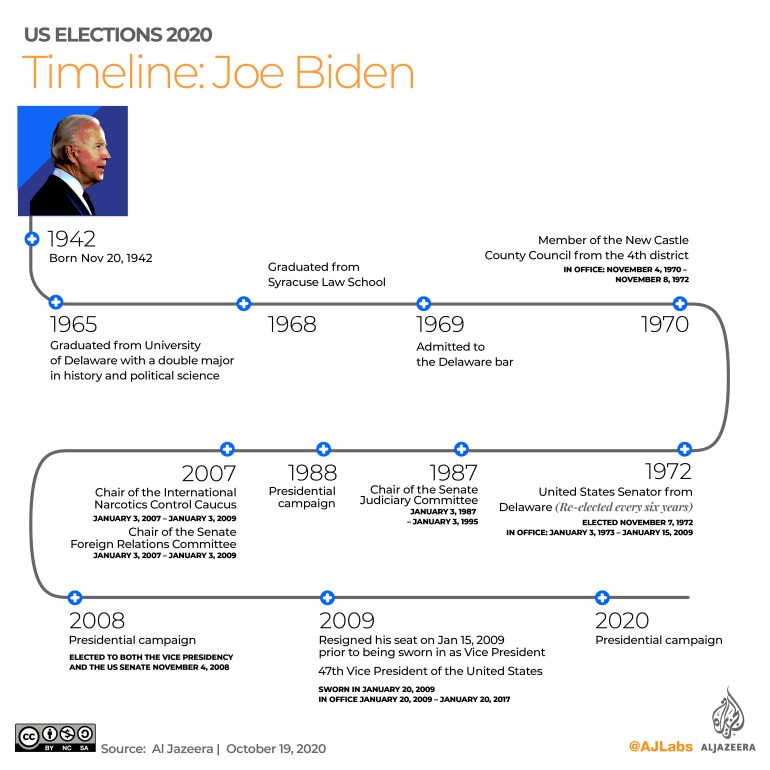Joe Biden's Story: From Scranton To President - Timeline & Insights
Could the story of a presidency truly be traced back to the quiet beginnings in a small Pennsylvania town, or is it a tapestry woven over decades of ambition, service, and unwavering resolve? Joe Biden's ascent to the 46th presidency of the United States is a testament to the enduring power of perseverance, a journey that began nearly eight decades ago, a path marked by both triumph and profound personal loss.
The narrative of Joseph Robinette Biden Jr. is, at its core, a story of American resilience. Born in Scranton, Pennsylvania, to Joseph Robinette Biden Sr., a car salesman, and Catherine Eugenia Finnegan, the young Biden's early life laid the groundwork for his future political endeavors. His roots in the working-class city of Scranton instilled in him a deep understanding of the struggles and aspirations of ordinary Americans, a perspective that would later shape his political ideology and resonate with voters across the nation. The foundations of his political career were built on the values of empathy, hard work, and a steadfast belief in the American dream. The journey from Scranton to the White House was a long one, marked by numerous pivotal moments that would define his leadership and leave an indelible mark on the nation's history. From his early days as a public servant to his two terms as Vice President under Barack Obama, Biden's career has been a study in dedication, evolving political acumen, and an unyielding commitment to public service. It's a story of someone who understood that leadership is not merely about holding office, but about the capacity to connect with people, to listen to their concerns, and to work tirelessly to improve their lives. This article seeks to explore the key milestones, the defining moments, and the enduring legacy of a man who dedicated his life to the service of his country.
| Full Name | Joseph Robinette Biden Jr. |
| Date of Birth | November 20, 1942 |
| Place of Birth | Scranton, Pennsylvania, USA |
| Spouse | Neilia Hunter Biden (1966-1972, deceased), Jill Tracy Jacobs Biden (1977-present) |
| Children | Beau Biden (deceased), Hunter Biden, Ashley Biden |
| Education | University of Delaware (B.A.), Syracuse University College of Law (J.D.) |
| Political Party | Democratic |
| Political Career Highlights |
|
| Key Policy Positions | Healthcare, Climate Change, Economic Reform, Foreign Policy |
| Key Accomplishments |
|
| Official Website | The White House |
The genesis of Bidens political life can be traced to Delaware, where he began his career in public service. After graduating from Syracuse University College of Law, he returned to Delaware and worked as a lawyer before entering politics. His foray into the political arena commenced with his election to the New Castle County Council in 1970, setting the stage for his later, more significant roles. This initial exposure to the world of public service and the needs of his constituents further solidified his understanding of the importance of civic engagement and the impact of government on the lives of everyday people.
The year 1972 marked a turning point in Biden's life when he was elected to the United States Senate at the young age of 29, becoming the fifth-youngest senator in history. This victory, however, was overshadowed by personal tragedy. Shortly after his election, his wife, Neilia, and his one-year-old daughter, Naomi, were killed in a car accident. His sons, Beau and Hunter, survived. In the aftermath of this devastating loss, Biden contemplated abandoning his political career. However, with the support of his family and friends, he decided to remain in the Senate, where he served for over three decades. This decision underscored his resilience, determination, and commitment to public service, even in the face of immense personal suffering. The period that followed was marked by both professional growth and personal healing as he navigated the complexities of Senate life while raising his two sons. The early years of his Senate career were formative, as he honed his skills in lawmaking, forged relationships with colleagues from across the political spectrum, and began to establish himself as a prominent voice on issues ranging from criminal justice to foreign policy.
As a senator, Biden focused on a wide range of issues. He played a crucial role in shaping the legislative landscape, and his influence expanded over time. He became a leading voice on foreign policy, serving as the chairman of the Senate Foreign Relations Committee, where he played a key role in shaping American foreign policy. He also served as chairman of the Senate Judiciary Committee, where he oversaw several important judicial appointments and played a pivotal role in shaping criminal justice legislation. One of his notable contributions was the Violence Against Women Act of 1994, which he championed. This legislation provided crucial resources to combat domestic violence and sexual assault, and it helped establish the Office on Violence Against Women within the Department of Justice. Throughout his time in the Senate, Biden earned a reputation for being a skilled negotiator, a pragmatist, and a consensus-builder, qualities that would later serve him well in his role as Vice President and President.
The culmination of a lifelong career in politics came with his election as the 46th President of the United States. On January 20, 2021, Joe Biden was sworn into office, marking the beginning of a new chapter in American history. His victory in the 2020 presidential election over incumbent Donald Trump was a historic moment, and it came after a campaign characterized by unprecedented challenges, including the COVID-19 pandemic and intense political polarization. Biden's inaugural address, delivered on the steps of the U.S. Capitol, emphasized unity, healing, and a return to traditional American values. It underscored his commitment to addressing the pressing issues facing the nation and to restoring faith in the democratic process. The challenges he faced upon assuming office were formidable, including a deeply divided nation, a struggling economy, and the ongoing coronavirus pandemic. His presidency began with immediate priorities, including combating the pandemic, boosting the economy, and addressing climate change. He brought to the office a deep understanding of the inner workings of the government, along with a network of relationships that he had cultivated over his long career in Washington, D.C.
One of the defining aspects of Biden's presidency was his emphasis on bipartisanship and his efforts to bridge the political divide. He made it a priority to work with members of both parties to pass legislation, a strategy that was both praised and criticized in a highly polarized political environment. While the results were mixed, he did manage to achieve some significant bipartisan victories, including the Infrastructure Investment and Jobs Act, a landmark piece of legislation that invested in roads, bridges, and other vital infrastructure projects. Another significant accomplishment was the American Rescue Plan Act of 2021, a comprehensive COVID-19 relief package. This initiative provided economic assistance to individuals, businesses, and state and local governments. The Biden administration also took steps to address climate change, rejoining the Paris Agreement, and setting ambitious goals for reducing greenhouse gas emissions. His administration also focused on strengthening alliances and restoring relationships with international partners. However, his term as president was not without its share of controversies and challenges, and he navigated numerous political and economic crises during his time in office.
Joe Biden's journey to the presidency is also a story of love and companionship. His marriage to Jill Biden, which began in 1977, has been a cornerstone of his personal life. They were married for 47 years. The first lady, a lifelong educator, played an active role in the administration, advocating for education, military families, and cancer research. Their relationship served as an inspiration to many, demonstrating the power of partnership and mutual support. Their enduring partnership provides a constant reminder of the importance of family, love, and resilience in navigating the challenges of public life. The Biden's have been married for 47 years, weathering personal losses, political storms, and the relentless pressures of public life.
The story of Joe Biden, however, is not yet complete. His time in the White House witnessed significant challenges and achievements. His legacy will be shaped by the decisions he made, the policies he championed, and the impact he had on the lives of Americans and people around the world. His career spans decades in public service, holding significant roles in both the legislative and executive branches of the u.s. His impact will be debated for years to come. It is a journey that started almost 78 years ago in northern pennsylvania.
The timelines of his presidency provide a framework for understanding the key events and decisions that shaped his time in office. The timeline from the third quarter of 2021, spanning July 1 to September 30, 2021, offers insights into the early months of his administration, from the rollout of vaccination programs to the passage of the American Rescue Plan. Similarly, timelines of the fourth quarter of 2022, covering October 1 to December 31, 2022, highlight the challenges and achievements of the middle part of his term, including the implementation of the Infrastructure Investment and Jobs Act. The timelines of the presidency in the third quarter of 2024, spanning July 1 to September 30, 2024, will give a full scope of the work done by the president.
The impact of the Biden presidency, like that of any leader, is multifaceted and open to interpretation. His administration faced a myriad of challenges, including the ongoing economic and social ramifications of the COVID-19 pandemic, rising inflation, and increasing geopolitical tensions. Simultaneously, the Biden administration was also focused on major legislative achievements. During his time in office, Biden oversaw the Supreme Court hearings, drafted legislation, and focused on a wide range of issues. He focused on key policy positions, including healthcare, climate change, and economic reform. His career reflects decades of public service, culminating in the highest office in the land. He has made promises to make the United States a better place. This makes up the crux of the legacy.



Detail Author:
- Name : Prof. Cleve Ziemann I
- Email : laurence02@yahoo.com
- Birthdate : 2006-04-14
- Address : 782 Brian Haven Beerstad, FL 70412
- Phone : +1.623.842.3735
- Company : Friesen, Doyle and Gorczany
- Job : Economics Teacher
- Bio : Ipsa blanditiis minima ex molestiae rem. Vel voluptatem mollitia error aliquid veniam incidunt vero. Iure explicabo unde dolores. Accusantium modi itaque omnis facere ipsa.